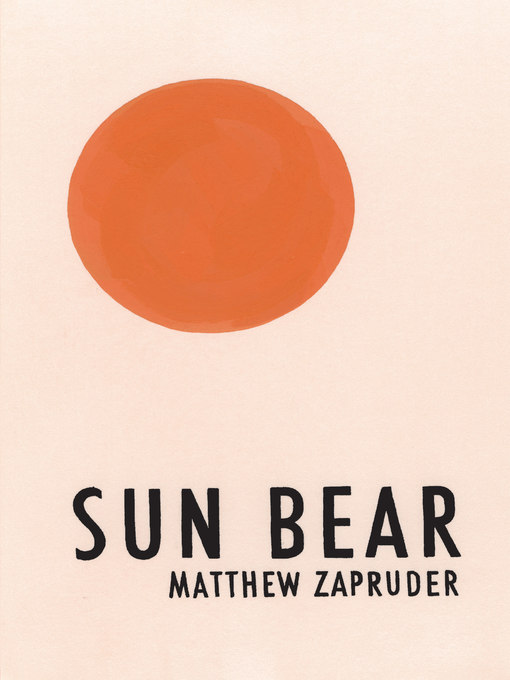
Sun Bear
فرمت کتاب
ebook
تاریخ انتشار
2015
نویسنده
Matthew Zapruderناشر
Copper Canyon Pressشابک
9781619321335
کتاب های مرتبط
- اطلاعات
- نقد و بررسی
- دیدگاه کاربران
نقد و بررسی

March 31, 2014
Zapruder (Come On All You Ghosts) is at his most meditative and conscious in his fourth collection, displaying a gentle wit and willingness to let the smallest banality open to wider observation. Starkly honest about the state of the natural, human world, Zapruder implicates his own desires—“I need things/ no one can buy// and don’t even know/ what they are// I know I belong/ in this new dark age”—and lifestyle—“I want to go to sleep again and wake// somewhere and turn on the faucet/ without feeling as if I am destroying anything/ and drink some coffee that doesn’t taste like blood.” What buoys the collection is his insistence on making the often disturbing facts of life not simply new, but strange and humorous in their familiarity: “veryone worships us/ because we have declared our love/ they think we have.../ silently pondered/ the philosophical questions/ actually we were talking a lot/ about what we had for lunch.” Zapruder grasps both the absurd and tragic in the modern: “When I go to the bank.../ hollow with desire.../ Toward my numbers/ I walk, a tragic/ precursor condemned/ to an easy life/ balanced on the suffering/ in another land/ of strangers I might/ someday speak to/ when I call to complain.”

March 15, 2014
One thing leads to another--sort of--in this latest from Zapruder, William Carlos Williams Award winner for The Pajamaist. These free verse poems are reminiscent of work by e.e. cummings in their general apperance, lack of punctuation, and surreal, mystical themes. Tumbling effortlessly down the page, they start out as interior observations about everyday happenings set in mundane places such as the grocery store or the zoo or a bedroom. In "Aubergine," for example, the narrator lies in bed staring at the ceiling and thinking about the book he read the previous night. The poem describes what the narrator sees and how he responds until the words begin a kind of free association that ends in a dream or dreamlike state. Initially, Zapruder's poems exhibit a logical order but then veer off in new directions that do not obviously connect to the previous thought. Yet--and here's the beauty of Zapruder's work--the poetry makes eminent sense partly because Zapruder writes until his subject develops into a poem, and then he stops. Take one of the best poems here, "What Can Poetry Do," which does not explain what poetry can do. Instead, like all good poetry, it shows how the form does what it does. VERDICT Though these poems possess little coherence and less logic, that's part of their charm--and in fact their point. A worthy addition to most collections.--C. Diane Scharper, Towson Univ., MD
Copyright 2014 Library Journal, LLC Used with permission.

March 15, 2014
After the imaginative fever of Come on All You Ghosts (2010), Guggenheim fellow Zapruder tones things down in his wry fourth collection. He is ruminative and plain-spoken, forthright and hard-hitting, as in the title poem, in which he pays tribute to a zoo bear and expresses concern about our ability to destroy ourselves and every other living entity. Zapruder is attentive to what we call news, painfully aware that as he reads, people die. I just sit in my room and worry. Yet his humble attentiveness to the world and willingness to convey personal revelations; his open anxiety; tricky, needling humor; and brain-teasing syntax are oddly tonic and reassuring. His short-lined, constricted poems are ladder-like columns down which we tumble. He is riddling and insistent when it comes to accepting ambivalence and ambiguity. Zapruder writes of a long-ago baseball game, radiation from Japan's Fukushima nuclear disaster, a fruit-fly invasion, terrible governors, a map of the world, contrariness, guilt, and love. And as he ponders the everyday conflation of the trivial and the profound, he refuses any easy out.(Reprinted with permission of Booklist, copyright 2014, American Library Association.)

























دیدگاه کاربران